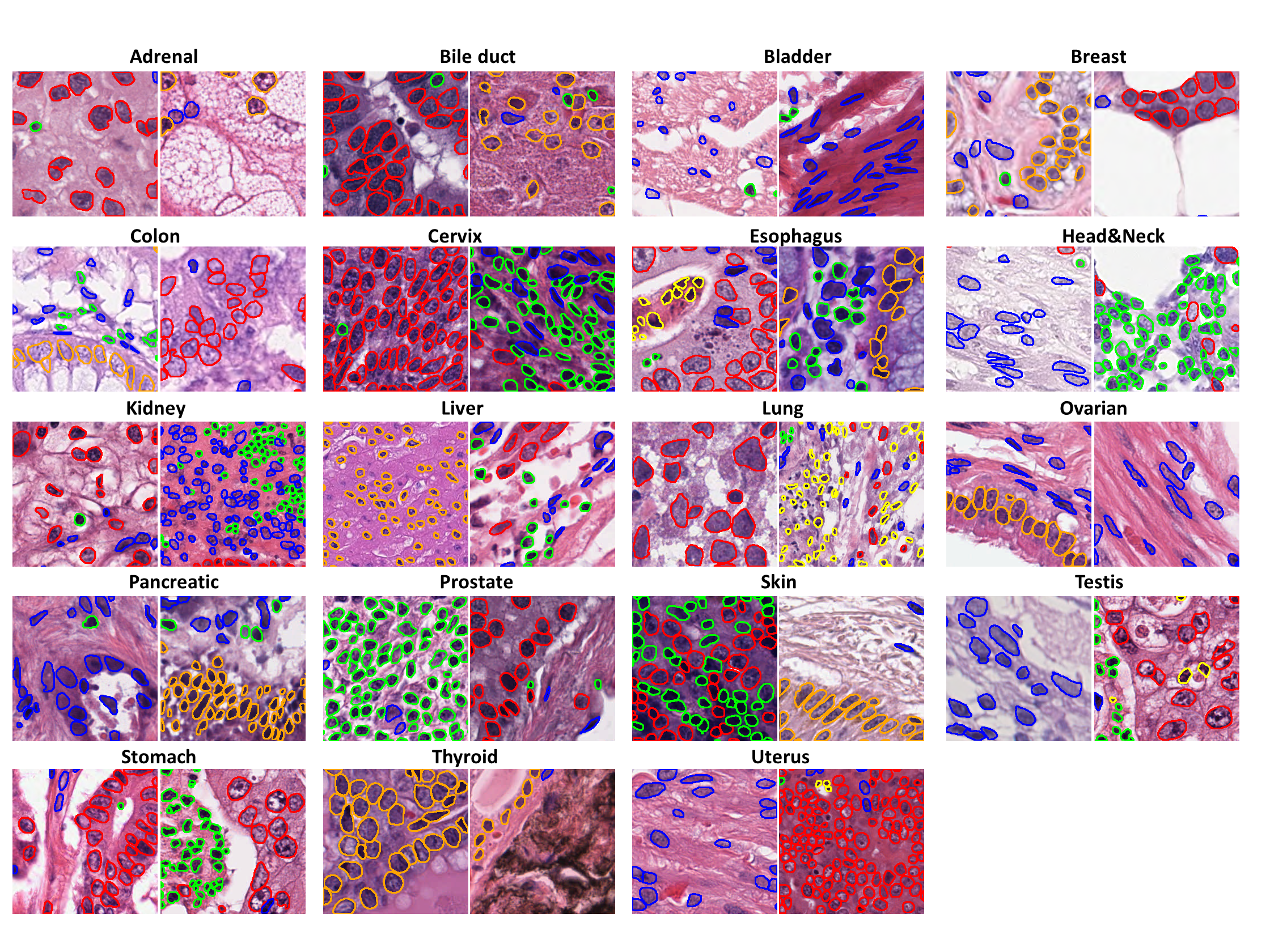Datasets:
dataset_info:
features:
- name: image
dtype:
image:
mode: RGB
- name: instances
sequence:
image:
mode: '1'
- name: categories
sequence:
class_label:
names:
'0': Neoplastic
'1': Inflammatory
'2': Connective
'3': Dead
'4': Epithelial
- name: tissue
dtype:
class_label:
names:
'0': Adrenal Gland
'1': Bile Duct
'2': Bladder
'3': Breast
'4': Cervix
'5': Colon
'6': Esophagus
'7': Head & Neck
'8': Kidney
'9': Liver
'10': Lung
'11': Ovarian
'12': Pancreatic
'13': Prostate
'14': Skin
'15': Stomach
'16': Testis
'17': Thyroid
'18': Uterus
splits:
- name: fold1
num_bytes: 283673837.64
num_examples: 2656
- name: fold2
num_bytes: 267595457.439
num_examples: 2523
- name: fold3
num_bytes: 293079722.82
num_examples: 2722
download_size: 1665092597
dataset_size: 844349017.8989999
configs:
- config_name: default
data_files:
- split: fold1
path: data/fold1-*
- split: fold2
path: data/fold2-*
- split: fold3
path: data/fold3-*
license: cc-by-nc-sa-4.0
task_categories:
- image-segmentation
task_ids:
- instance-segmentation
language:
- en
tags:
- medical
- cell nuclei
- H&E
pretty_name: PanNuke
size_categories:
- 1K<n<10K
paperswithcode_id: pannuke
PanNuke
Dataset Description
- Homepage: PanNuke Dataset for Nuclei Instance Segmentation and Classification
- Leaderboard: Panoptic Segmentation
Description
PanNuke is a semi-automatically generated dataset for nuclei instance segmentation and classification, providing comprehensive nuclei annotations across 19 tissue types and 5 distinct cell categories. The dataset includes a total of 189,744 labeled nuclei, each accompanied by an instance segmentation mask, and contains 7,901 images, each sized 256×256 pixels. The images were captured at x40 magnification with a resolution of 0.25 µm/pixel. The dataset is highly imbalanced, with the "Dead" nuclei category being particularly underrepresented.
Please note that the dataset was created by extracting patches from whole-slide images (WSIs). As a result, some nuclei located at the edges of patches may be cropped, with fewer than 10 visible pixels in certain cases.
Dataset Structure
The dataset is organized into three folds: fold1, fold2, and fold3, consistent with the original dataset structure. Each fold contains data in a tabular format with the following four columns:
image: The RGB tile of the sample.instances: A list of nuclei instances. Each instance represents exactly one nucleus and is in binary format (1- nucleus,0- background)categories: An integer class label for each nucleus, corresponding to one of the following categories:- Neoplastic
- Inflammatory
- Connective
- Dead
- Epithelial
tissue: The integer tissue type from which the sample originates, belonging to one of these categories:- Adrenal Gland
- Bile Duct
- Bladder
- Breast
- Cervix
- Colon
- Esophagus
- Head & Neck
- Kidney
- Liver
- Lung
- Ovarian
- Pancreatic
- Prostate
- Skin
- Stomach
- Testis
- Thyroid
- Uterus
Citation
@inproceedings{gamper2019pannuke,
title={PanNuke: an open pan-cancer histology dataset for nuclei instance segmentation and classification},
author={Gamper, Jevgenij and Koohbanani, Navid Alemi and Benes, Ksenija and Khuram, Ali and Rajpoot, Nasir},
booktitle={European Congress on Digital Pathology},
pages={11--19},
year={2019},
organization={Springer}
}
@article{gamper2020pannuke,
title={PanNuke Dataset Extension, Insights and Baselines},
author={Gamper, Jevgenij and Koohbanani, Navid Alemi and Graham, Simon and Jahanifar, Mostafa and Khurram, Syed Ali and Azam, Ayesha and Hewitt, Katherine and Rajpoot, Nasir},
journal={arXiv preprint arXiv:2003.10778},
year={2020}
}
